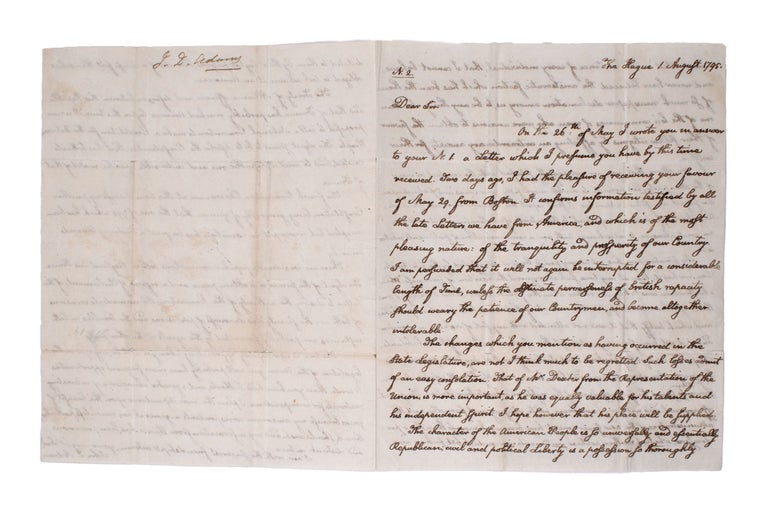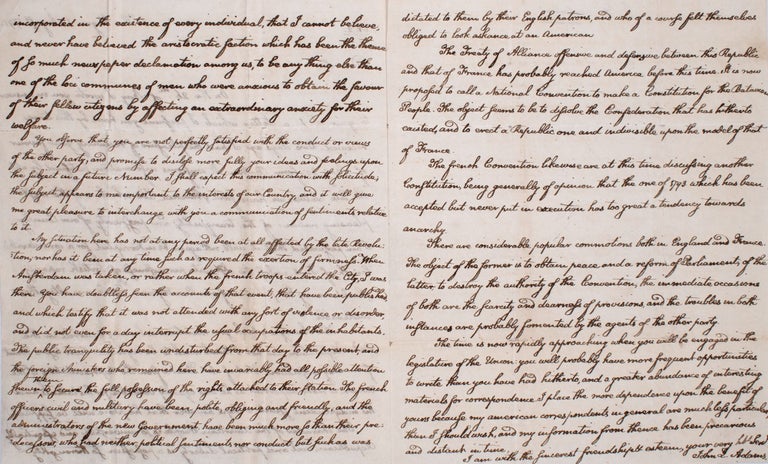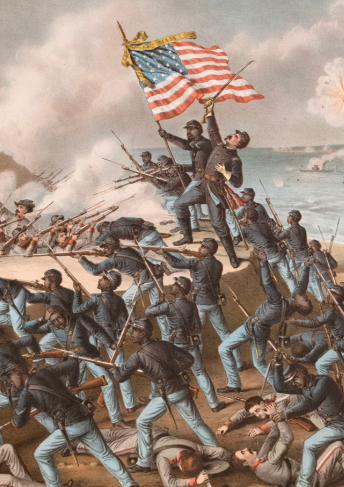"The character of the American people is so universally and essentially republican..."
Important Autograph Letter Signed, to Nathaniel Freeman, on the disagreements between Federalists and Democratic Republicans, on the Batavian Revolution, the French Constitution of 1795 and the relationship with Great Britain.
The Hague: August 1, 1795.
Price: $12,000.00
About the item
3pp. 4to. "The character of the American people is so universally and essentially republican..." Usual folds. Partially published in The Writing of John Quincy Adams, vol. 1, p. 390. (New York, 1913).
Item #346574
Nathaniel Freeman, Jr. (1766-1800) was a Harvard classmate of Adams. Initially elected to the Fourth Congress as a Federalist Representative in 1795, he would change party affiliation to Jefferson's Democratic Republicans in 1797.
Adams's letter opens by referring to previous communications between the two and noting that Freeman's last "confirms information testified by all the late letters we have from America ... the tranquility and prosperity of our country. I am persuaded that it will not again be interrupted for a considerable length of time, unless the obstinate perverseness of British rapacity should weary the patience of our Countrymen and become altogether intolerable." Next, he discusses changes in the Massachusetts state legislature, referencing losses and Mr. Dexter, before turning to the assertions made by Democratic Republicans about the Federalists:
"The character of the American people is so universally and essentially republican; civil and political liberty is a possession so thoroughly incorporated in the existence of every individual, that I cannot believe, and have never believed the aristocratic faction, which has been the theme of so much newspaper declamation among us, to be any thing else than one of loci communes of men who were anxious to obtain the favor of their fellow citizens, by affecting an extraordinary anxiety for their welfare. You observe that you are not perfectly satisfied with the conduct or views of the other party, and promise to disclose more fully your ideas and feelings upon the subject in a future Number [i.e. letter]. I shall expect this communication with solicitude; the subject appears to me important to the interests of our Country, and it will give me great pleasure to interchange with you a communication of sentiments relative to it."
The letter continues by discussing the Batavian Revolution in detail, in which French revolutionary forces had occupied the Netherlands: "My situation here has not at any period been at all affected by the late Revolution ... When Amsterdam was taken, or rather when French troops entered the City, I was there ... The public tranquility has been undisturbed from that day to the present, and the foreign ministers who remained here have invariably had all possible attention shewn them to secure the full possession of the rights attached to their station. The French officers civil and military have been polite, obliging and friendly, and the administrators of the new government have been much more so than their predecessors who had neither political sentiments nor conduct by such as was dictated to them by their English patrons and who of a course felt themselves obliged to look askance at an American..."
The letter next discusses the 1795 Treaty of the Hague, the proposals for a new French Constitution to replace the revolutionary one of 1793 and the motivations of the English and French: "There are considerable popular commotions in England and France. The object of the former is to obtain peace and a reform of Parliament, of the latter to destroy the authority of the Convention; the immediate occasions of both are the scarcity and dearness of provisions, and the troubles in both instances are probably fomented by agents of the other party."
The letter closes by wishing Freeman well in Congress and hoping for more frequent letters with news from home.



